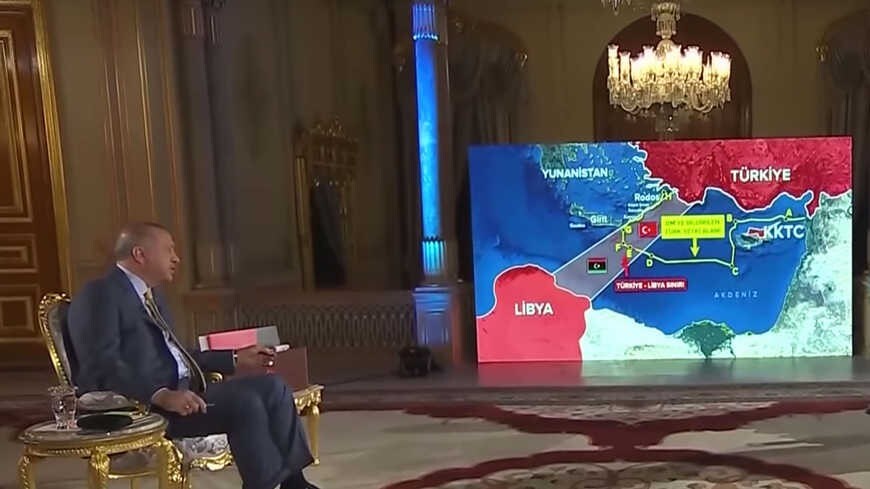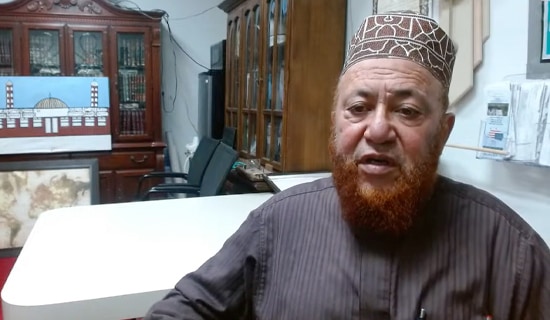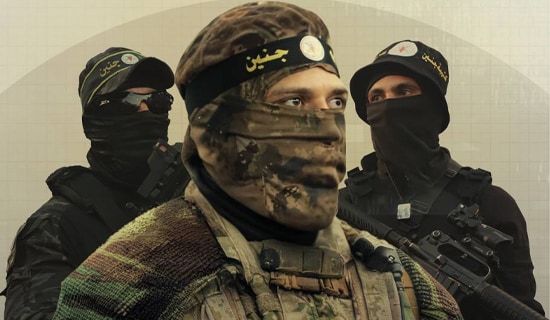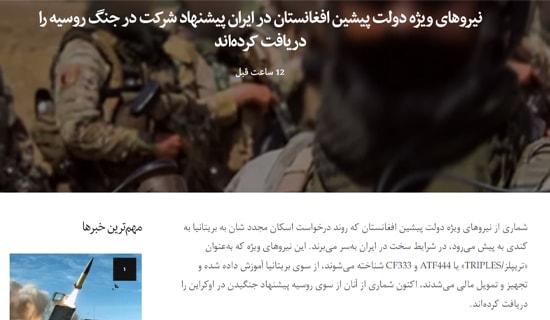
Islamist fighters in Tripoli, Libya
Libya's political situation is characterized these days by a civil war between a mostly Islamist side based in Tripoli, in west Libya, and a mostly non-Islamist side based in Tobruk, in east Libya, with both sides being aided by foreign governments with conflicting interests. The confusion is further exacerbated by the fact that according to the 2015 UN-sponsored agreement between the rival parties, the so called "UN-recognized" or even "internationally recognized" West Libya side is not the legitimate one, and is actually a usurper.
The UN-led Libyan Political Agreement of December 2015 sought to give temporary legal cover – until new elections in 2016 – to both political rivals: an elected parliament in east Libya and an (Islamist) executive in Tripoli that needed the parliament's approval. However, the elected parliament did not approve the Islamist government in two confidence votes, and thus the government failed to meet the required stipulation in the 2015 UN-sponsored agreement. Nevertheless, the Tripoli government has continued to rule in west Libya and is still considered "the UN-recognized government." The continued illegal rule of the Libyan Islamists is a repeat of their refusal to transfer power to the newly elected parliament following their humbling defeat in the 2014 elections.
This quest for dominance is in line with the Muslim Brotherhood motto: "Allah is our objective; the Prophet is our leader; the Quran is our constitution; jihad is our way; dying for Allah is our highest hope." The movement's emblem shows two crossed swords under the Quran and the word "prepare," originating in the Quran in reference to the non-believers: "And prepare against them what force you can and horses tied at the frontier, to frighten thereby the enemy of Allah and your enemy and others besides them, whom you do not know (but) Allah knows them."

Muslim Brotherhood emblem with the words "Prepare" and "The Muslim Brotherhood"
Thus, the UN-brokered agreement now serves as a fig leaf for the actual development – a creeping Islamist militia takeover propped up by Turkey and Qatar. In response, their regional rivals in Egypt and the United Arab Emirates support the other side. The following update is aimed at explaining the source of current Libya's complexities.
The Libyan Islamists Rejected The Election Results
After the 2011 toppling of Libyan leader Colonel Muammar Al-Qadhafi, with NATO intervention, two elections were held in Libya, in 2012 and 2014, to replace the interim legislative body which was established shortly after the beginning of the anti-Qadhafi popular uprising. The two election rounds were run transparently, but had low turnout and were accompanied with threats to candidates and voters.
The first nationwide elections in more than 40 years were held in July 2012, with 2,600 candidates, most of whom were independents, and 400 who represented political parties. In the democratically elected 200-member General National Congress, a moderate coalition won 39 out of the 80 seats reserved for parties while its Islamist rivals, a political wing of the Muslim Brotherhood, won 17. The remaining 120 seats were won by ostensibly independent candidates.
Since its election in 2012, the National Congress became unpopular among Libyans who viewed it as having made little progress in improving governance. Libya would have five different prime ministers between 2012 and 2015, some of whom were kidnapped by militias. The Islamists succeeded in winning over a majority of the supposedly independent assembly members, while some liberal or moderate members fled eastwards.
For the second elections, held in June 2014, about 1.5 million voters were registered, almost half of the 2.8 million who registered for the 2012 elections. The elections were marred by deadly violence and low turnout – only some 600,000 people voted, less than a quarter of those eligible.[1] In these elections, no seats were reserved for political parties and all candidates ran as independents. Hence, the exact political significance of the elections can only be estimated: In the newly elected 200-seat House of Representatives, Islamists only won 30 seats. Their poor showing triggered violence by Islamist militias in Tripoli.[2]
The Islamist-controlled National Congress refused to hand the reins of power to the newly elected House of Representatives. It reconvened in Tripoli and declared the formation of a National Salvation Government, preventing the peaceful transition of political power and actually staging a coup d'état against the newly elected parliament. Libya Dawn,[3] a Muslim Brotherhood-led alliance of Islamist militias, mobilized in Tripoli and took control of institutions there, forcing the newly elected House of Representatives out of Tripoli. It moved to Tobruk in east Libya, near the Libyan-Egyptian border,[4] and Libya now was ruled by two organs – only one, the parliament, having been elected – and no stability. At that time, the parliament in east Libya enjoyed the backing of the international community as Libya's sole legislative body.
On The Way To Civil War, The UN Brokered Two Deals – That Failed
Following heavy fighting among rival Libyan groups in 2014 and 2015, the UN Support Mission in Libya[5] facilitated negotiations between Libyan rival parties. These talks led to a deal among the main factions, that created the Government of National Accord. Both camps, in west and east Libya, expressed commitment to the deal, but in reality, they competed for influence throughout the two-year of the implementation period defined in the deal, that should have ended with new national elections.
In December 2015, under UN sponsorship, delegates from Libya's warring factions signed a political agreement in the Moroccan town of Skhirat.[6] The Skhirat Agreement produced a most complex political structure for Libya, that would have four interim authorities during a transitional period, with the two main ones being an executive organ, the aforementioned Government of National Accord (GNA), and a legislative organ called the House of Representatives. The agreement empowered a relatively unknown politician from a prominent Libyan family of Turkish origin, Fayez Al-Sarraj, to form the government, that was then endorsed by the UN Security Council which recognized this GNA as "the sole legitimate Government of Libya."[7]
It is important to note that according to the 2015 UN sponsored Skhirat Agreement, the House of Representatives in east Libya must approve the GNA in west Libya before the latter can assume office. Without such a vote of confidence, the GNA has no legal standing. However, in 2016 the elected House twice voted down the list of ministers[8] proposed for confirmation, thus declining to formally recognize the GNA in Tripoli. Despite that, the UN and some countries still refer to the Tripoli government as the "UN-recognized Libyan government" or "the internationally recognized Libyan government."
Prime Minister Al-Sarraj in Tripoli competed for influence with the House of Representatives in east Libya and its military force, the Libyan National Army. The east Libya House of Representatives appointed Khalifa Belqasem Haftar as commander of the Armed Forces nine months before the signing of the Skhirat Agreement. The Tripoli-based government has been protected by its affiliated Islamist militias,[9] such as the Tripoli Revolutionaries Brigade, deployed in the center and east of Tripoli, and the Rada Special Deterrence Force which includes Salafi forces, stationed east of Tripoli.
Western Involvement: Several Conferences But Little Progress
Four international parleys have failed to solve Libya's political intricacies: in Paris (May 2018), in Palermo (November 2018), in Berlin (January 2020) and in Geneva (February 2020). The U.S.'s formal position in Libya was stated in the U.S. Senate in February 2020: "The United States continues to undertake efforts to achieve stability in this geopolitically significant, oil rich nation... What is at stake is more than Libya, but peace and stability across the southern and eastern Mediterranean region". More specifically, the U.S. aims are "the dismantling of non-state armed groups – 'militias' – that operate with impunity; the rooting out of extremist elements... and the just distribution of Libya’s [oil] resources."[10]
In spite of this solemnly declared policy, the U.S. – which maintains close political and military ties with Qatar – supports the Tripoli government in west Libya, comprising the Islamist "extremist elements" of the Muslim Brotherhood and protected by its armed militias, and instead of a "just distribution of Libya's [oil] resources," the U.S. supported the transfer of all oil revenues to Tripoli via the UN. Moreover, on June 22, the U.S. stated its official support of Al-Sarraj's position, that the Haftar-led east Libyan forces must withdraw east of Sirte, the important oil port.[11] A direct result of this withdrawal would be that revenues from oil exports through Sirte would be funneled to the UN, which in turn would give them to the Al-Sarraj government, as it did before Sirte had been seized by the Haftar forces. However, both Haftar and Egyptian president Al-Sisi declared this to be a red line that must not be crossed, and were met with harsh reactions.[12]

Prime minister Fayez Al-Sarraj, center, at June 22 meeting near Tripoli with the U.S. ambassador to Libya and the commander of the U.S. Africa Command. (Reuters)
Turkey's Intervention
Qatar and President Recep Tayyip Erdoğan's Turkey, both sponsors of the Muslim Brotherhood, are the staunchest supporters of Al-Sarraj's Tripoli government. Their intervention goes back to Qadhafi's removal, when the two countries supported forces of radical Islam in Libya. In November 2019, Turkey and Al-Sarraj's west Libya government signed two agreements, one on military cooperation and another on maritime boundaries in the eastern Mediterranean, that would help Turkey explore for natural gas and oil and maintain its interests. Erdoğan announced that Turkey would quickly start granting licenses for exploration and drilling in the region, adding that Turkey's exploration ship would begin seismic research operations there as well.[13]
However, Aquila Saleh Issa, who had headed Libya's internationally recognized parliament at the time of the UN-backed deal in 2015, deemed the deal "invalid."[14] Egypt, seeking international opposition to Turkey's intervention in Libya, hosted France, Greece, Cyprus and Italy in Cairo on January 8 2020, and declared the two agreements void.[15] Italy did not sign the closing statement of the Cairo meeting, describing it as "very unfair" to Al-Sarraj and Turkey.[16]

Turkish President Erdoğan views the maritime corridor he created between Turkey and Libya
Turkey also continued to send weapons to Tripoli's militias, in violation of the UN arms embargo on Libya. It has ramped up its support to Al-Sarraj's government, and reportedly sold $350 million worth of military equipment to allied Islamist militias in their fight against their rival forces of the east Libya's army, who launched an offensive in April 2019 to seize Tripoli.[17]
According to a 2019 report of a UN Panel of Experts on Libya, Turkey and the Tripoli government were regularly in non-compliance with resolution 1970 (2011),[18] that called for an arms embargo on Libya. The report states that Turkish companies were involved in illicit transfers of weapons to the Islamist Libya Dawn coalition.[19] It listed Turkey as one of the countries (Jordan and the UAE were two others) that "routinely and sometimes blatantly supplied weapons, employing little effort to disguise the source."[20] Al-Sarraj acknowledged that his government received weapons from Turkey[21] and his interior minister, Fathi Bashagha, acknowledged the transfer of armored vehicles through the port of Khoms. Turkey also supplied combat drones to Tripoli, along with Turkish officers to operate them,[22] and it sent to Libya 2,000 recruits that it mobilized from Turkey-sponsored Islamist militias in Syria.[23]
Following a formal request by Al-Sarraj, Erdoğan's initiative to send military aid to Libya was approved by the Turkish parliament on January 2020,[24] and in an interview with the CNN Turk TV channel Erdoğan admitted that Turkish soldiers had started gradually moving to Libya to support the Tripoli government.[25]
Erdoğan created a fait accompli in Libya by deciding to deploy Turkish forces and send Syrian mercenaries to impose his interests in any future Libyan settlement. The UN Panel of Experts had previously identified Chadian and Sudanese mercenaries serving on both sides, and now Syrians, also on both sides, while the east Libya forces also used the Russia-backed Wagner mercenaries. But in fighting for Tripoli, it was the effective Turkish use of its drones, which proved decisive and forced Haftar's army to retreat. Turkey seems to have also been successful in jamming and then destroying Russian Pantsir S-1 air defense provided to Haftar's army.[26]
It is noteworthy that Turkey is motivated not only by its immediate interest in the Libyan oil fields but also by Erdoğan's quest to rebuild the Ottoman empire. It was only 150 years ago that Libya was ruled by the Ottomans, a connection that Erdoğan emphasized in a speech in January 2020, saying: "Libya, which is a reminder of [16th century Ottoman admiral] Barbarossa, was for centuries an important part of the Ottoman Empire."[27]
Qatar's Intervention
Meanwhile, Turkey's ally, Qatar, has aggressively sought to establish an Islamist order in Libya and counter the agenda of Egypt, UAE, and Saudi Arabia that support the eastern parliament and its army. Since the creation of the Al-Sarraj government in Tripoli, Qatar has been steadfast in supporting it. Qatari Emir Tamim bin Hamad Al Thani vowed to support it in the security and economic areas.[28] Qatar helped establish the Doha-based Libya Al-Ahrar television channel, which has been supporting the Tripoli forces.[29] The official Qatari News agency QNA reported on March 14, 2017 that Qatari Emir Aal Thani had renewed support to the west Libya government.[30]
According to a Tripoli statement on December 16, 2019, the Qatari emir had said that "the Qatari state will increase its effort for Libya to overcome the crisis it is experiencing" and that he was prepared to provide every kind of economic and security support that they requested.[31] It is characteristic that Qatar mobilized the International Union of Muslim Scholars, which is the religious authority for the Muslim Brotherhood and holds its offices in Doha. On April 7, 2019 the Union referred to the Haftar offensive as “an atrocious aggression that must be repelled and confronted”, and called on the Arab states, people and the UN “to provide sufficient support to the GNA to repel the aggression and continue to achieve unity, legitimacy and stability of the Libyan people.” [Middle East Monitor, April 8, 2019]
The Turkey-Qatar alliance with regard to Libya was well expressed in the Qatari spokesman's July 2 interview with Al-Jazeera following Erdoğan's Doha visit. He said that the visit "underlines the depth of the relations between the states... there is an identity in positions... especially because of their support of the agreement government in Libya and in the political process in Libya."[32]

Erdoğan and Qatari Emir Sheikh Tamim bin Hamad Al Thani in Doha, July 2, 2020
Libya's eastern neighbor, Egypt, strongly denounced the Turkish intervention.[33] Egypt, which sees Turkish military intervention in Libya as a "matter of Egyptian national security,"[34] announced that any such deployment could "negatively affect the stability of the Mediterranean region." Along with the UAE, Egypt seeks to curb the influence of political Islam and crack down on Islamist militants. In June, standing before rows of Egyptian tanks on the Libyan border, Egyptian President Al-Sisi warned that an attempt by the Turkey-Tripoli alliance to seize key points of Libya's oil crescent, including Sirte, was an Egyptian redline.[35] Turkey's regional opponents in Libya responded with an airstrike at a key airbase immediately after the visit of the Turkish Defense Minister to Tripoli on July 6, 2020.[36] Russia has supported Haftar's army with weapons, expertise and equipment.

Egyptian President Al-Sisi reviews troops on the Libyan border, June 20, 2020
The Libya Riddle: Why Does The Usurper Government In Tripoli Enjoy International Recognition?
As noted above, although the Libyan Islamists had twice lost the elections, in 2012 and 2014, their Tripoli government refused to transfer power to the legitimate majority of non-Islamists. Moreover, the Al-Sarraj Tripoli government failed twice in its attempt to win confidence in the elected House of representatives in Tobruk, as required by the Skhirat agreement, and thus, under this UN brokered agreement, it should be considered non-valid. Based on these criteria, the Islamist government is actually a usurper.
Celebrating the 2015 Skhirat agreement between the rivaling sides, the UN hastily declared the Al-Sarraj government "UN-recognized," but the UN has continued to use this descriptor even after it became obvious that it does not reflect legitimacy. This policy has been followed by Western states, and thus the illegitimate Tripoli government still enjoys "recognition" by international players and the media. Italy, which is invested in the oil industry in Libya, is siding with the Tripoli government. Other European countries show lack of interest not only in Libya per se but also in the new Muslim Brotherhood alliance and its ensuing aggression at their doorstep, and are reluctant to enter into the legitimacy dispute in Libya, which eventually may necessitate conclusions. France is an exception, and it vocally opposes the Turkish aggression in Libya. On June 23, French President Emmanuel Macron stated: "Turkey is playing a dangerous game in Libya and is in breach of all commitments it took during the Berlin conference." On June 29, Macron labeled the Turkish intervention "criminal."
The UN attitude may have been adopted because of political inertia, but a more plausible explanation may be found in Qatar's special relations with the United Nations Organization. In December 2019 Qatar announced a USD 500 million framework, funding 10 UN Agencies, including the Security Council's Counter Terrorism Committee and the Center for Applying Insights to Extremist Behavior. Several UN agencies will establish a permanent presence in Qatar. For Qatar, a notorious ally of designated terrorist organizations such as the Taliban and Al-Qaeda as well as the Muslim Brotherhood militias in Libya, this was a remarkable achievement. On that occasion, UN Secretary General Guterres said: "Today’s development is a quantum leap in the relationship between Qatar and the UN. Today Qatar is a structural partner to the United Nations."[37] Since negotiations to that end must have lasted several years, it would be logical to believe that when that "structural partner" advises on Libya it enjoys an attentive ear with the UN officialdom.
This diplomatic moral and political vacuum serves Turkey and Qatar well. Naturally allying with their Libyan partners of the Muslim Brotherhood, they have been pushing their military efforts, both financially and militarily, saving them from defeat several months ago.
All these complexities have resulted in a precarious situation in Libya. On July 20, at the request of Al-Sisi, the Egyptian parliament unanimously approved "sending elements of the Egyptian Armed Forces on combat missions outside the borders of the Egyptian state, to defend Egyptian national security in the Arab strategic direction against the actions of armed criminal militias and foreign terrorist elements..." A day later, Al-Azhar, the most important religious institution in the country and the leading institution in the Sunni Islamic world, declared its support for all measures adopted by the Egyptian leadership, "to protect national security and borders in the face of foreign threats." On July 23, Libyan tribal leaders met with Al-Sisi in Cairo, and the spokesman for the Egyptian president quoted the head of the Supreme Council of Sheiks and Notables of Libya as having said "We need the support of the Egyptian armed forces to expel the Turkish colonizer."[38]
Turkey saved the Tripoli government from defeat in June, and if the Islamist forces, aided by Turkey and Qatar, continue eastwards to seize Sirte, Egypt may move its forces into Libya to counter their advance. A serious escalation in the Libyan strife may thus be expected in the near future.

Libyan tribal heads meet with Egyptian President Al-Sisis in Cairo, July 23 (Source: Spokesman of the Egyptian presidency)
*Yigal Carmon is President and Founder of MEMRI; Romany Shaker is a Research Fellow at MEMRI.
[1] Bbc.com/news/world-africa-28005801, June 26, 2014.
[2] Foreignpolicy.com/2014/07/22/libyas-islamists-go-for-broke/, July 22, 2014.
[3] Libya Dawn originally referred to the operation launched by the militias to seize Tripoli but soon came to refer to the armed groups coming under its umbrella.
[4] Reuters.com/article/us-libya-security-insight/libyas-runaway-parliament-seeks-refuge-in-tobruk-bubble-idUSKCN0HR1GO20141002, October 2, 2014.
[5] The UNSMIL was first led by Ian Martin on September 19, 2011. UN Secretary-General Ban Ki-moon then appointed Tarek Mitri of Lebanon on September 12, 2012, to succeed Martin. Bernardino León was then appointed on August 14, 2014. Martin Kobler then succeeded León as UN Special Representative envoy to Libya on November 4, 2015. On June 22, 2017, UN Secretary-General António Guterres named Ghassan Salamé of Lebanon as his special envoy who continued to lead the UNSMIL until the present time.
[6] Reuters.com/article/us-libya-security-idUSKBN0U00WP20151217, December 17, 2015.
[7] Un.org/press/en/2015/sc12185.doc.htm, December 23, 2015.
[8] Reuters.com/article/us-libya-security-un-idUSKCN10X1DY, August 22, 2016.
[9] Smallarmssurvey.org/fileadmin/docs/T-Briefing-Papers/SAS-SANA-BP-Tripoli-2019.pdf, August 2019.
[10] Ly.usembassy.gov/u-s-senate-foreign-relations-committee-u-s-libya-policy, February 12, 2020.
[11] Thearabweekly.com/after-talks-gna-us-delegation-draws-ceasefire-line-beyond-sirte, June 23, 2020.
[12] See MEMRI TV Clips Nos. 8808, President El-Sisi Threatens To Intervene If Terrorist Forces, Militias Cross The Sirte-Jufra Line, Adds: We Love Libya – Our Goal Would Be To Restore Security And Stability, June 20, 2020; 8105, Commander Of GNA Army's Operation In Sirte And Jufra Brig.-Gen. Ibrahim Beit Al-Mal: Al-Sisi Is Crazy And All Talk; We Will Respond With Full Force To Any Egyptian Aggression In Libya, June 21, 2020; and 8156, Mohamed Naser Ali, TV Host On Turkey-Based Muslim Brotherhood Channel, Warns: Libya Would Be Like Vietnam For The Egyptian Army; El-Sisi Should Focus On The Ethiopian Renaissance Dam, July 19, 2020; and MEMRI Special Dispatch No. 8828, Arab Media Supports Egypt's Threat To Intervene Militarily In Libya: Turkey's Attempts To Become A Regional Superpower Must Be Stopped, July 2, 2020.
[13] Bloomberg.com/news/articles/2020-01-16/erdogan-says-turkish-energy-exploration-to-follow-libya-deal, January 16, 2020.
[14] Reuters.com/article/us-greece-libya-turkey/head-of-libya-parliament-says-turkey-libyan-deal-invalid-idUSKBN1YG26Z, December 12, 2019.
[15] Aawsat.com, January 10, 2020.
[16] Adnki.net/AKI/?p=54266, January 10, 2020.
[17] Wsj.com/articles/foreign-backing-brings-militias-in-libya-to-a-stalemateand-no-further-11569942469, October 1, 2019.
[18] Undocs.org/S/RES/1970(2011), February 26, 2011.
[19] Ecfr.eu/mena/mapping_libya_conflict; accessed January 9, 2020.
[20] Undocs.org/S/2019/914, December 9, 2019.
[21] Aawsat.com/english/home/article/1837556/libya%E2%80%99s-sarraj-admits-receiving-arms-turkey, July 31, 2019.
[22] Carnegie-mec.org/diwan/80776, January 14, 2020.
[23] Syriahr.com/en/?p=153109, January 16, 2020. See also MEMRI Special Dispatch No. 8395, Violating UN Arms Embargo, Turkey's AKP Government Ships Armed Drones, Armored Vehicles, 'Laser Weapons,' Other Arms And Ammunition To Pro-Islamist Government In Libya, Trains Libyan Military And Police Personnel, December 6, 2020.
[24] Reuters.com/article/us-libya-security-turkey/turkish-parliament-passes-libya-deployment-bill-but-troops-unlikely-for-now-idUSKBN1Z10UN, January 2, 2020; Dailysabah.com/politics/2019/12/26/libya-makes-formal-request-for-turkish-military-support, December 26, 2019. See also MEMRI Special Dispatch No. 8454, Turkish Parliament Approves Sending Of Troops To Libya, AKP Official Celebrates: 'Libya Will Be The 13th Country' To Which Turkey Has Sent Troops, January 2, 2020.
[25] Reuters.com/article/us-libya-security-turkey-military/turkish-military-units-moving-to-libya-erdogan-says-idUSKBN1Z40RW, January 5, 2020.
[26] Aljazeera.com/news/2020/05/libya-battle-sky-air-superiority-changed-war-200527135230131.html, May 28, 2020.
[27] Tccb.gov.tr/haberler/410/115281/-turkiye-nin-bu-donemde-attigi-adimlar-onumuzdeki-yarim-asri-bicimlendirecek-oneme-sahiptir-, January 14, 2020. See also MEMRI Special Dispatch No. 8390, Celebrating Turkey-Libya Agreement, Editor Of AKP Mouthpiece Pens Historical Blueprint For Return Of Ottoman Empire Through Territorial Expansion: 'Barbaros Is Back In The Mediterranean After 473 Years – From Now On, We Are Everywhere From North Africa To The East Mediterranean', December 3, 2019 and MEMRI Special Dispatch No. 8438, In Libya, Criticism Of Increasingly Close Relationship Between Turkey And Al-Sarraj's Government Of National Accord (GNA): Erdogan Wants To Bring Back The Ottoman Empire, Al-Sarraj's GNA Is Like The Vichy Government, December 27, 2019.
[28] Aa.com.tr/en/middle-east/qatar-vows-support-for-libyas-un-recognized-govt/1674309, December 15, 2019.
[29] Bbc.com/news/world-africa-13754900, January 8, 2019.
[30] Dogruhaber.com.tr/haber/630695-katardan-libya-ulusal-mutabakat-hukumetine-destek-aciklamasi, March 14, 2017.
[31] Dogruhaber.com.tr/haber/630695-katardan-libya-ulusal-mutabakat-hukumetine-destek-aciklamasi, March 14, 2017.
[32] Al-sharq.com, July 3, 2020.
[33] Af.reuters.com/article/topNews/idAFKBN1Z112A-OZATP, January 2, 2020.
[34] Bbc.com/news/world-africa-51003034, January 6, 2020.
[35] Ft.com/content/e6aa87b0-5e0b-477f-9b89-693f31c63919, June 21, 2020. See also MEMRI TV Clip No. 8808, President El-Sisi Threatens To Intervene If Terrorist Forces, Militias Cross The Sirte-Jufra Line, Adds: We Love Libya – Our Goal Would Be To Restore Security And Stability, June 20, 2020.
[36] Thearabweekly.com/rafale-attacks-turkish-targets-al-watiya-airbase-egyptian-or-french, July 6, 2020.





